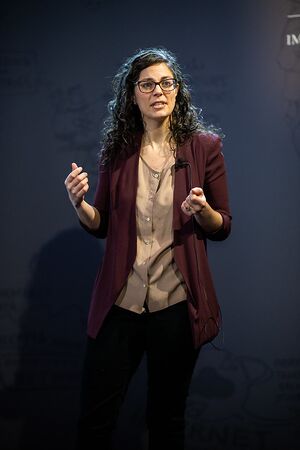Molly Crockett
( academic, neuroscientist) | |
|---|---|
 | |
| Nationality | US |
| Alma mater | • University of California (Los Angeles) • University of Cambridge |
| Member of | Edge Foundation, WEF/Young Global Leaders/2017 |
Molly J. Crockett is an American neuroscientist who studies human morality, altruism and decision making. In 2015, she showed that drugs targeting serotonin and dopamine in the brain can change moral decision-making in healthy people.[1]
She was selected a Young Global Leader by the World Economic Forum in 2017.
Imagine we could develop a precise drug that amplifies people's aversion to harming others; on this drug you won't hurt a fly, everyone taking it becomes like Buddhist monks. Who should take this drug? Only convicted criminals — people who have committed violent crimes? Should we put it in the water supply? These are normative questions. These are questions about what should be done. I feel grossly unprepared to answer these questions with the training that I have, but these are important conversations to have between disciplines. Psychologists and neuroscientists need to be talking to philosophers about this. These are conversations that we need to have because we don't want to get to the point where we have the technology but haven't had this conversation, because then terrible things could happen.[2]
Career
Molly Crockett is an Assistant Professor of Psychology at Yale University.[3] Previously she was an Associate Professor of Experimental Psychology at the University of Oxford, a fellow at University College London and University of Zürich, funded by the Sir Henry Wellcome Postdoctoral Fellowship from the Wellcome Trust, awarded in 2010.[4]
Originally from Irvine, California, after a Bachelor of Science at UCLA she completed her PhD at the University of Cambridge (King's College, Cambridge) where she was a Gates Cambridge Scholar.[5]
Work
Crockett studies behavioral neuroscience, with a particular focus on the role of neurotransmitters on decision-making, for example studying how antidepressants effect negotiations in experimental settings.[6][7] She received the 2019 Janet Taylor Spence Award from the Association for Psychological Science.
Morality Pills
In a 2015 study, she showed that manipulating serotonin and dopamine in the brain can cause changes in the participants' willingness to cause themselves or other people pain when being paid.[1]
One group of volunteers received either the serotonin-enhancing antidepressant drug citalopram or placebo. Enhancing serotonin made participants more reluctant to harm, regardless of whether this benefited themselves or another person. The volunteers who received citalopram were willing to pay nearly twice as much money as those who received placebo to prevent both themselves and other people from receiving pain. [1]
Another group of volunteers received either the dopamine-boosting Parkinson’s drug levodopa or placebo. Boosting dopamine appeared to induce more selfish decision-making..[1]
Events Participated in
| Event | Start | End | Location(s) | Description |
|---|---|---|---|---|
| WEF/Annual Meeting/2017 | 17 January 2017 | 20 January 2017 | Switzerland WEF | 2952 known participants, including prominently Bill Gates. "Offers a platform for the most effective and engaged leaders to achieve common goals for greater societal leadership." |
| WEF/Annual Meeting/2019 | 22 January 2019 | 25 January 2019 | Switzerland WEF | "The reality is that we are in a Cold War [against China] that threatens to turn into a hot one." |
References
- ↑ a b c d https://www.theguardian.com/science/head-quarters/2015/jul/13/how-do-common-medications-influence-moral-decisions
- ↑ https://www.edge.org/conversation/molly_crockett-molly-crockett-the-neuroscience-of-moral-decision-making
- ↑ https://psychology.yale.edu/people/molly-crocket
- ↑ http://www.wellcome.ac.uk/Funding/Biomedical-science/Funded-projects/Awards-made/Wellcome-Fellows/wtvm053173.htm
- ↑ http://www.gatescambridge.org/our-scholars/Profile.aspx?ScholarID=4831
- ↑ https://www.newscientist.com/article/dn19505-antidepressants-make-people-less-likely-to-harm-others
- ↑ https://web.archive.org/web/20121219201616/https://www.wired.co.uk/news/archive/2012-11/08/neurobollocks